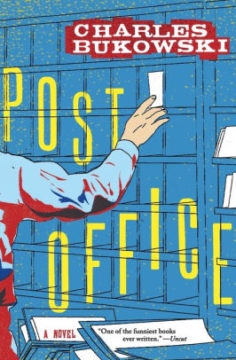Peter Richardson at the LARB:
 HALF A CENTURY AFTER the publication of Post Office (1971), how should we understand Charles Bukowski’s literary achievement? His publisher predicted that Bukowski would never reach a mainstream audience. And yet his books, including his poetry, have sold millions of copies in more than a dozen languages. Writing for The New Yorker in 2005, Adam Kirsch claims that Bukowski’s liminal status and seedy persona were part of his appeal: “He is one of those writers whom each new reader discovers with a transgressive thrill.” Describing his verse as “pulp poetry,” Kirsch also notes the author’s penchant for autobiography. “Bukowski’s poems are best appreciated not as individual verbal artifacts but as ongoing installments in the tale of his true adventures, like a comic book or a movie serial,” he observes. “They are strongly narrative, drawing from an endless supply of anecdotes that typically involve a bar, a skid-row hotel, a horse race, a girlfriend, or any permutation thereof.” That combination made a strong impression on readers. “The effect is as though some legendary tough guy, a cross between Philip Marlowe and Paul Bunyan, were to take the barstool next to you, buy a round, and start telling his life story.”
HALF A CENTURY AFTER the publication of Post Office (1971), how should we understand Charles Bukowski’s literary achievement? His publisher predicted that Bukowski would never reach a mainstream audience. And yet his books, including his poetry, have sold millions of copies in more than a dozen languages. Writing for The New Yorker in 2005, Adam Kirsch claims that Bukowski’s liminal status and seedy persona were part of his appeal: “He is one of those writers whom each new reader discovers with a transgressive thrill.” Describing his verse as “pulp poetry,” Kirsch also notes the author’s penchant for autobiography. “Bukowski’s poems are best appreciated not as individual verbal artifacts but as ongoing installments in the tale of his true adventures, like a comic book or a movie serial,” he observes. “They are strongly narrative, drawing from an endless supply of anecdotes that typically involve a bar, a skid-row hotel, a horse race, a girlfriend, or any permutation thereof.” That combination made a strong impression on readers. “The effect is as though some legendary tough guy, a cross between Philip Marlowe and Paul Bunyan, were to take the barstool next to you, buy a round, and start telling his life story.”
more here.
